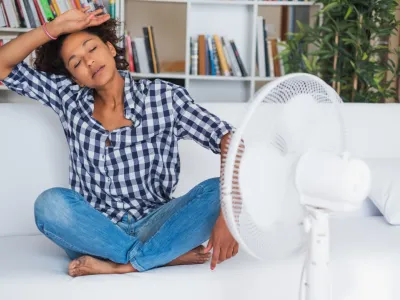Control moisture to keep your home comfortable and healthy this summer

Published July 6, 2021
Humidity plays a big part in the comfort and overall health of homes. High indoor humidity levels in the summer could potentially increase energy bills too.
High humidity makes us feel warmer in the summer (and colder in the winter), causing us to cool (or heat) our homes more than we tend to do in drier conditions. Increased moisture in the home can also lead to costly repairs over time, as high humidity levels can damage walls, flooring, furniture, and cracks. Left untreated, high moisture levels can cause mold growth, which creates unhealthy indoor air quality.
The Environmental Protection Agency (EPA) recommends keeping indoor humidity levels between 30 and 50 percent. What is comfortable -- and feasible -- will vary from person to person and home to home, and homes will naturally be more humid in the summer than in the winter. The Center for Energy and Environment recommends avoiding humidity levels above 60 percent in the summer to prevent mold and bacterial growth.
Below are some tips to keep your moisture levels down:
- Use a humidity gauge to help identify the right moisture level for the home. A humidity gauge will also help determine if you’re running the dehumidifier the right amount. If your home’s thermostat doesn’t have a humidity gauge built in, you can pick one up at many hardware or home improvement stores.
- Seal any cracks or holes. Air movement accounts for more than 98% of water vapor movement. Cracks or holes can allow air movement through unintended paths in and out of a house, potentially increasing the amount of moisture entering the home. Sealing any cracks can help reduce air movement and control ventilation.
- Improve your drainage system. This includes extending downspouts from gutters away from the foundation of your home, ensuring gutters and downspouts are clean, and keeping soil sloping away from the foundation.
- Increase appropriate ventilation. Run exhaust fans in the bathroom and kitchen, especially during and after cooking or taking a shower, to remove excess humidity.
- Replace furnace filters regularly if you have central air conditioning (A/C). Clogged filters will make the A/C have to work harder and use more energy to cool your home. Clean filters allow your air conditioner to remove moisture more easily and use less energy in the process.
- Take colder and shorter showers. Consider a low-flow shower head or showering under a less powerful stream to maximize water efficiency and reduce the amount of water vapor produced. Some utilities, including CenterPoint Energy, offer these energy efficiency items for free.
- Consider an energy-efficient dehumidifier. Dehumidifiers can help reduce and maintain levels of humidity, especially for homes without air conditioning. You can buy a portable or a whole-home dehumidifier depending on your home and your budget. If you can, aim to buy a dehumidifier that is ENERGY STAR-certified, as they use 30% less energy than conventional dehumidifiers.
Sometimes, moisture is a bigger problem that requires a more involved solution, with professional support to diagnose the problem and offer solutions. Here are some examples of bigger investments that may be required to get at the heart of a moisture problem.
- Insulation. Insulation can help reduce heat transfer and flow. Consult a qualified builder and/or contractor for specific moisture control measures that are tailored to your home’s construction style and type of insulation and the local climate here in Minnesota.
- Replace your carpet. Carpets can retain moisture, increase the amount of moisture in your home, and hide mold. If moisture is continually a problem, you may want to replace your carpet with another type of floor covering.
Appropriate measures that fit your budget can help you stay comfortable and healthy during these super humid summer days. If you would like some more suggestions for reducing your home energy expenses or have any particular questions about your home, please reach out to info@cubminnesota.org or call 651-300-4701.